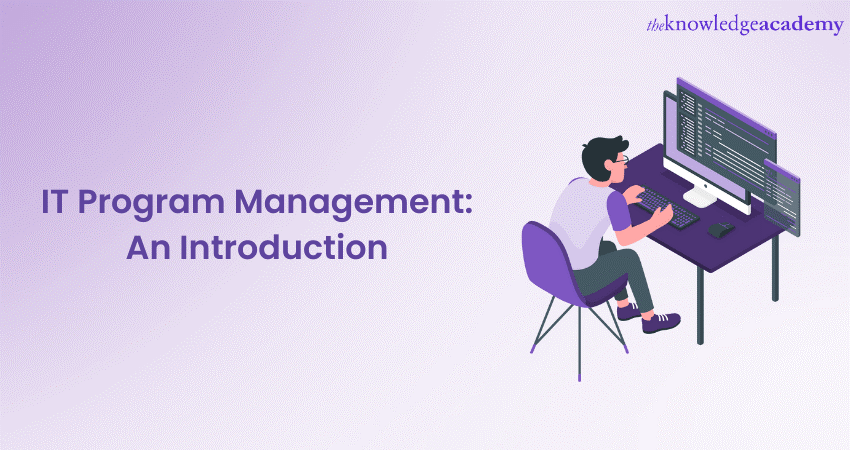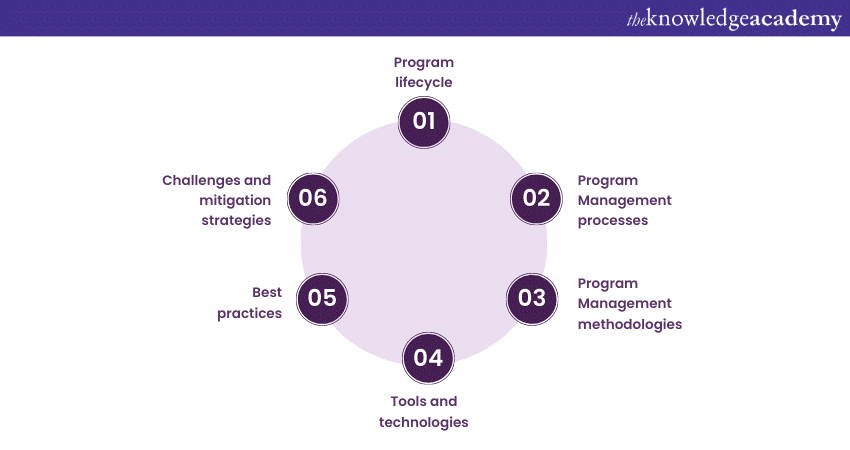We may not have the course you’re looking for. If you enquire or give us a call on + 1-866 272 8822 and speak to our training experts, we may still be able to help with your training requirements.
Training Outcomes Within Your Budget!
We ensure quality, budget-alignment, and timely delivery by our expert instructors.

Information Technology (IT) has become an integral part of business organisations. It helps them achieve their strategic goals and manage their operations effectively and efficiently. However, managing IT projects and programs not only requires technical expertise, it also needs management expertise. As a result, the need for IT Program Management has increased substantially in recent years. It is a discipline that focuses on overseeing and delivering large-scale IT initiatives, ensuring they are aligned with business goals and executed efficiently. This blog will explore what IT Program Management is, its purpose, framework, and some viable career options.
Table of Contents
1) What is IT Program Management?
2) Framework of IT Program Management
3) Viable career paths in IT Program Management
4) Recommended degrees and certifications for IT Program Management
5) Conclusion
What is IT Program Management?
IT Program Management is managing and coordinating a set of related projects, activities, and resources to achieve specific strategic objectives within the domain of information technology. It involves overseeing multiple interdependent and interconnected projects that deliver value to the organisation by aligning IT initiatives with its overall goals and objectives. IT Program Management serves multiple purposes within an organisation:
a) Strategic alignment: Linking IT programs to the organisation's goals and objectives.
b) Resource utilisation: Optimising the allocation of budget, personnel, and technology.
c) Risk management: Identifying and mitigating potential program risks.
d) Integration and coordination: Ensuring collaboration and alignment across projects and stakeholders.
e) Governance and control: Establishing structures and mechanisms for oversight and accountability.
f) Value delivery: Maximising the value generated by IT programs.
Distinction between Project Management and Program Management
While Project Management focuses on the execution of individual projects, Program Management takes a broader perspective by managing interconnected and mutually dependent projects. Program Management provides the strategic framework and governance needed to ensure these projects work cohesively towards achieving the organisation's desired outcomes.
Learn how to identify and evaluate the program and operational activities and develop Program and Project Management standards with the Program Management Professional (PgMP)® training.
Framework of IT Program Management

IT Program Management operates within a framework that provides structure, processes, and methodologies to effectively manage and deliver complex IT programs. Understanding this framework is essential for successful program execution. Here are the key components of the framework.
Program lifecycle
The program lifecycle encompasses an IT Program's stages, from initiation to closure. These stages typically include initiation, planning, execution, monitoring and control, and closure. Each phase has specific activities, deliverables, and milestones contributing to the program's success.
Program Management processes
Program Management processes encompass activities and tasks that ensure effective program delivery. These processes include program scoping, stakeholder identification and management, risk assessment and mitigation, change management, performance monitoring, and others. Adhering to these processes helps ensure the program is managed systematically and efficiently.
Program Management methodologies
Various methodologies are available to guide IT Program Managers. These methodologies provide a structured approach to managing programs, outlining best practices, tools, and techniques for program planning, execution, and control. Common methodologies include Waterfall, Agile, and hybrid approaches. Selecting the most appropriate methodology depends on the nature of the program and the organisation's preferences.
Tools and technologies
IT Program Management uses various tools and technologies to support program execution and collaboration. These tools include Project Management Software, collaboration platforms, document management systems, and analytics tools. They help Program Managers track progress, manage resources, facilitate communication, and provide insights for informed decision-making.
Get certified as a Project Management Professional and take your Project Management career to the next level with our PMP® Certification Training Course.
Best practices
Implementing industry-recognised IT Program Management best practices enhances the chances of success of the program. These best practices encompass establishing a Program Management Office (PMO) to provide governance and support, defining clear program objectives and deliverables, fostering effective communication and stakeholder engagement, conducting regular program reviews and evaluations, and promoting continuous improvement. Adhering to these best practices helps ensure consistency, quality, and alignment with industry standards.
Challenges and mitigation strategies
IT Program Management comes with its share of challenges. These challenges include scope creep, resource constraints, stakeholder conflicts, technology limitations, and changing business requirements. Effective Program Managers anticipate these challenges and develop mitigation strategies to address them. Strategies may involve proactive risk management, Effective Communication, agile adaptation, contingency planning, and stakeholder collaboration to navigate obstacles.
Viable career paths in IT Program Management
The following are some of the career paths that you can take for a successful career in this domain:
IT Program Manager
As an IT Program Manager, you would lead and oversee large-scale IT programs and initiatives. You would collaborate with stakeholders, define program objectives, develop strategic plans, allocate resources, and ensure successful program execution. This role requires strong leadership skills, the ability to manage complexities, and a deep understanding of technology and business alignment.
Program Management Office (PMO) Manager
As a PMO Manager, you would establish and manage the Program Management Office, a central hub for program governance and support. Your responsibilities would include:
a) Developing standardised processes and methodologies
b) Providing guidance and mentoring to program managers
c) Ensuring consistent program delivery
This role requires good organisational and communication skills and a focus on driving efficiency and continuous improvement.
Take your Portfolio Management skills to the next level with our Portfolio Management Professional (PfMP®) course.
Portfolio Manager
As a Portfolio Manager, you would oversee a portfolio of IT Programs and Projects within an organisation. Your role would involve:
a) Prioritising projects based on strategic objectives
b) Allocating resources
c) Monitoring program performance
d) Ensuring alignment with the organisation's goals
This career path requires strong analytical and decision-making skills. It also requires balancing competing priorities and managing a diverse range of projects.
IT Consultant
IT Consultants specialising in Program Management provide expert advice and guidance to organisations. They help clients optimise their IT investments, define program strategies, implement best practices, and drive successful program delivery. This career path offers opportunities to work with various clients and industries, requiring strong consulting and communication skills and in-depth knowledge of Program Management methodologies.
Agile Coach
With the growing adoption of agile methodologies, the role of an Agile Coach has gained prominence in IT Program Management. Agile Coaches support organisations in adopting and scaling agile practices, coaching teams, facilitating agile ceremonies, and ensuring successful agile Program Management. This career path requires a deep understanding of agile principles, excellent coaching and facilitation skills, and the ability to drive cultural and organisational change.
Get ready to excel in project management with our PMI Project Management Ready course! Enhance your skills, expand your knowledge, and stand out in the competitive job market.
Recommended degrees and certifications for IT Program Management
A career in this domain often requires a combination of education, experience, and industry-recognised credentials. Here is a list of degrees and certificates popular and beneficial for professionals pursuing a career in IT Program Management.
a) Bachelor's degree in IT or Computer Science: It provides a solid foundation in technology fundamentals and prepares individuals for entry-level roles.
b) Master's Degree in IT or MBA: It equips professionals with advanced IT strategy, leadership, and business analytics knowledge for senior-level positions.
c) PMP certification: It validates Project Management expertise, including program planning, execution, and control.
d) PgMP certification: It shows proficiency in strategic Program Management, governance, and stakeholder engagement.
e) CSM certification: It focuses on Agile principles and Scrum framework for successful Agile Program Management.
f) ITIL Foundation certification: It enhances understanding of IT service management processes and workflows.
g) CPMP certification: It validates knowledge in program governance, planning, execution, and risk management.
h) PMI-ACP certification: It demonstrates proficiency in Agile methodologies for managing Agile programs effectively.
Become a certified Agile Project Manager with the PMI-ACP® Certification Training.
Conclusion
IT Program Management is critical in ensuring the successful execution of large-scale IT initiatives. IT Program Managers drive organisational success by providing strategic direction, governance, and coordination. It also offers a rewarding career path in the technology industry. Professionals can succeed in this dynamic field by understanding the purpose, exploring career paths, grasping the framework, and obtaining relevant degrees and certifications. It empowers professionals to drive change and contribute to organisational success in the digital age.
Become proficient and knowledge about project and Program Management with our range of PMP Training courses.







 Top Rated Course
Top Rated Course




 If you wish to make any changes to your course, please
If you wish to make any changes to your course, please


